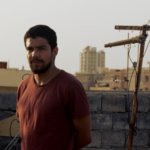Meet some the characters in Sao Paulo from “Brazil: Destination Sao Paulo“
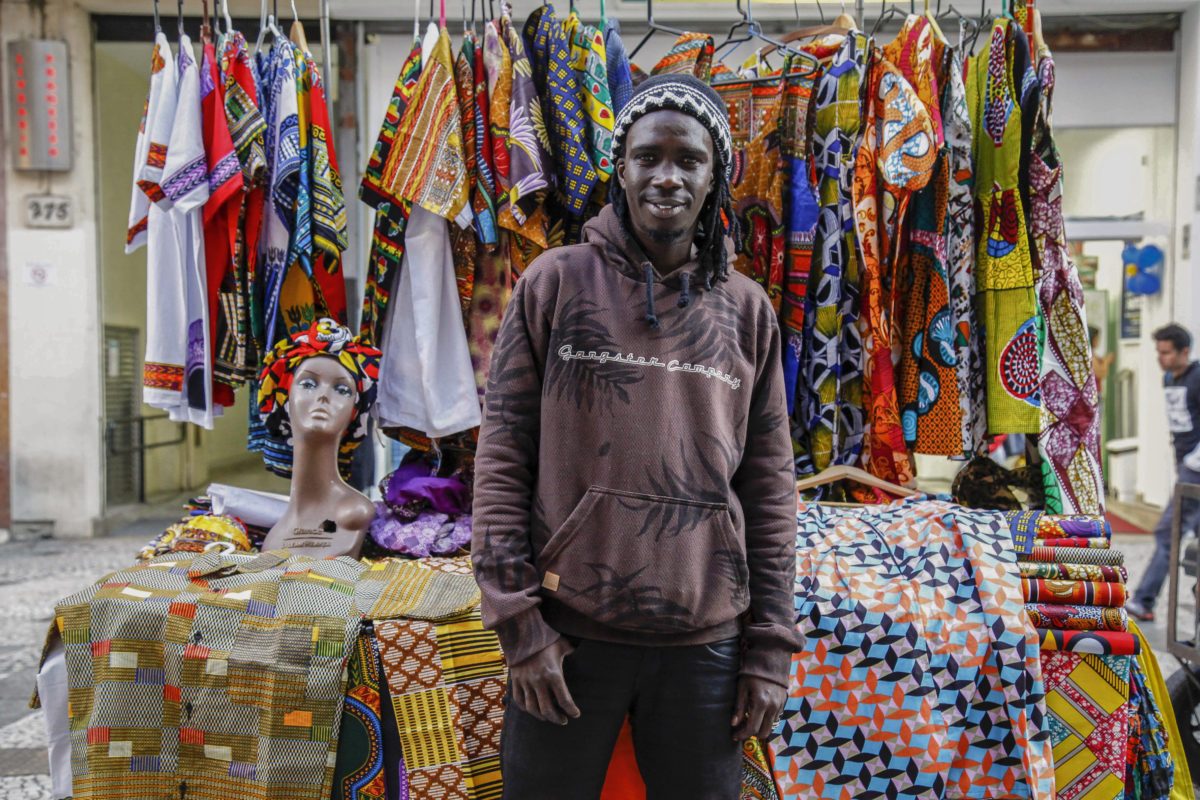
Abu, 37, a Senegalese refugee, sells African wax-prints in the surroundings of Republica Square in Sao Paulo, Brazil, on 04 July of 2017. (Photo by Marcelo Pereira)
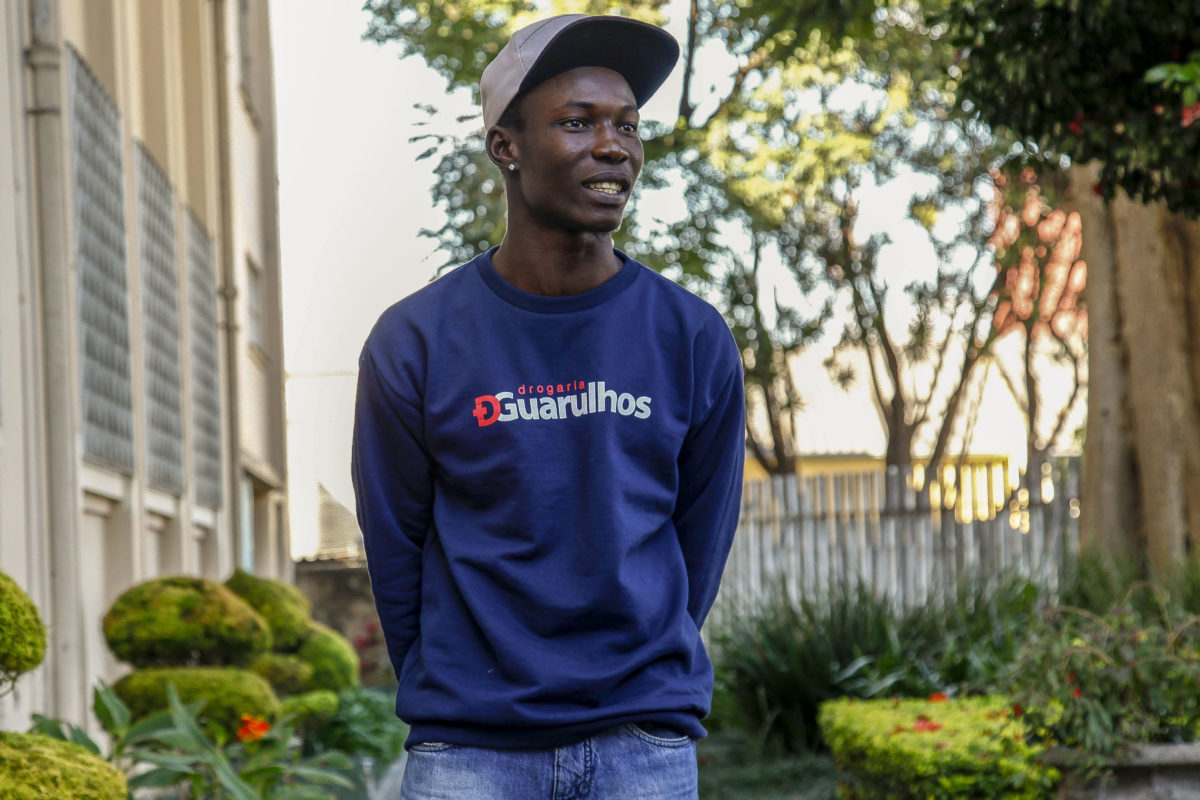
Clement, a Guinean refugee, walks outside the Scalabrinian Mission Shelter in Sao Paulo, Brazil, on 05 July of 2017. (Photo by Marcelo Pereira)
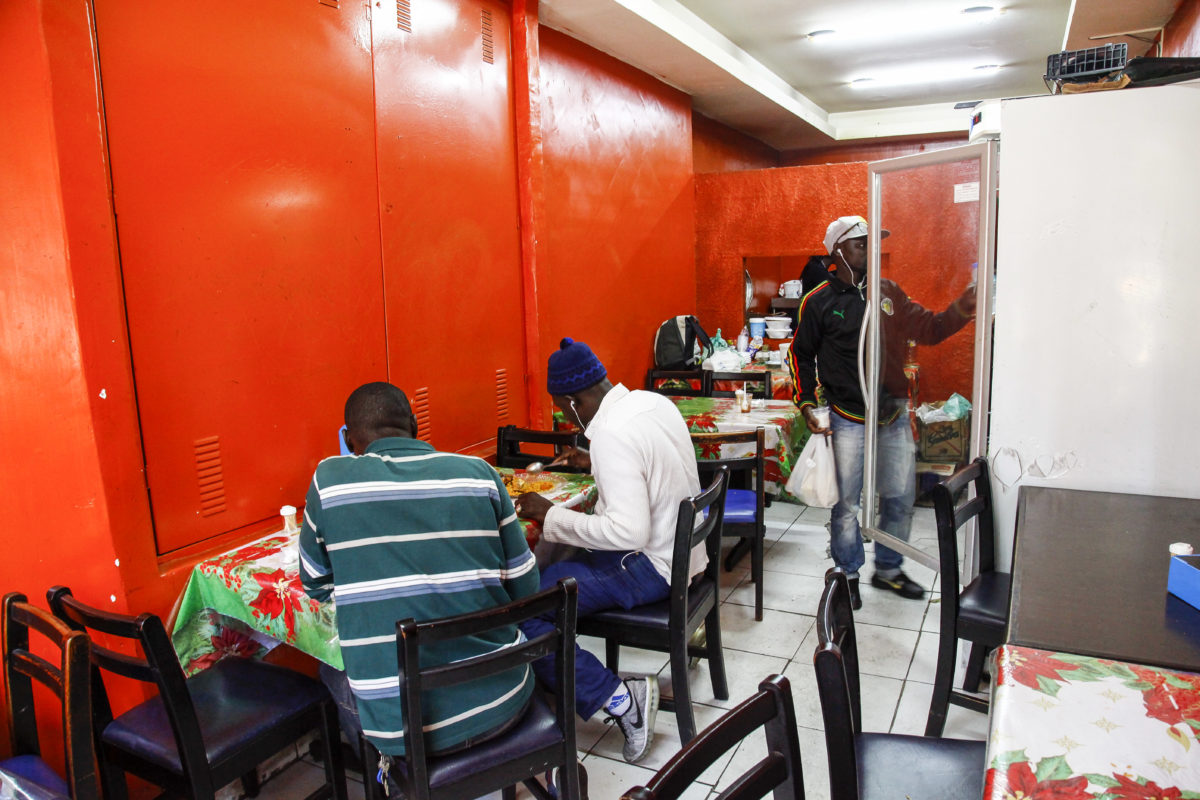
Senegalese restaurant Lalingé became a meeting point for refugees in Sao Paulo, Brazil, on 04 July of 2017. (Photo by Marcelo Pereira)
Brazil has been generally receptive to refugees. Its legal framework is modern and permissive. Still, integration has not been easy for many migrants and would-be refugees coming across the Atlantic Ocean.
Many complain about racism and corruption in Brazil.
We interviewed many in Sao Paulo who were mulling their future as migrants, or were awaiting permanent documents – which allow them to stay and work legally in Brazil. Many were already working informally, selling goods on the streets.
Today there are is concern about exploitation of refugees in illegal sewing facilities, in particular, those led by Bolivian gangsters in the east of the city, where a large counterfeit market in Sao Paulo features clothing sewed locally by a migrant workforce.
According to a report by the Sao Paulo city government, a quarter of refugees helped by the local Reference Center for Migrant Assistance (CRAI) are educated. But due to a lack of institutional recognition of their qualifications, many end up in unskilled jobs, or illicit work.
Here are some of their stories.
Fitah, 32, Somalia
Fitah has been a refugee for ten years but has only been in Brazil for a few months. After leaving his home country in 2007 due to the civil war, he went to South Africa, where he stayed until March 2017. Paying $4,000 USD to smugglers in Johannesburg, he managed to enter Brazil posing as a South African refugee. He wanted to travel on to the United States, but the “travel package” offered by his smugglers only gave him two options, Turkey or Brazil. He chose the latter.
Afonso, 28, Congo
Upstairs in one of the big bedrooms of the Scalabrinian Mission Afonso, a 28-year-old migrant from Congo, explained how he came from Kinshasa in 2015 by boat, escaping from the violent conflicts raging in his own country. He hired the service of smugglers and came on a cargo ship with a number of others. He paid for part of the trip by working on the ship. He was left in the coast of Santos, a city 55km away from Sao Paulo. He is now searching for a job.

Abu, 37, a Senegalese refugee, sells African wax-prints in the surroundings of Republica Square in Sao Paulo, Brazil, on 04 July of 2017. (Photo by Marcelo Pereira)
Jorge, 25, Guinea-Bissau
Jorge is a trained engineer who came to Brazil two years ago, who is now selling counterfeit and smuggled clothes in a local market. His Brazilian girlfriend is now pregnant and he is waiting for a work permit in order to get a job as mason. He said that when Federal Police went to his home address to confirm he was living there – an essential step in the process of issuing a work visa to a migrant – his house mates thought they wanted to arrest him and denied he lived there. It delayed his chance of getting a permit that would allow him a legal and better-remunerated job. The lack of trust in Brazilian law enforcement is a huge issue among refugees and migrants, many say that they rarely provide help or support, but instead only make their lives more difficult.
Abu, 37, Senegal
In República Square in the downtown Centro neighbourhood, African migrants sell clothes – some of them counterfeit designer wear, some not – and handicrafts. Abu, 37, from Thiès in western Senegal, came to Brazil in 2010 with the hope that World Cup would make Brazil a prosperous country and offer him a new life. He says migrants should be respected for having the courage to leave everything behind and restart from nothing. Discrimination and lack of jobs are an issue for Abu, so he says his plan now is to save money and go to Europe as soon as possible. When he first arrived, he had money to stay in a hotel for seven days. After that, he met people who got him a job as a street vendor for contraband and traditional Senegalese clothes sewn in Brazil with African fabrics. Every time the police come and seize the goods he sells, it can take up to five months to recover the money lost.
Santa Efigenia neighbourhood
Santa Efigenia is an area of around ten street blocks in the heart of the Centro area where locals say you “won’t find anything original or any product that entered the country legally”. There are dozens of galleries with local merchants, migrants and hawkers selling their wares, and crowds shouting and grabbing to sell counterfeit and contraband electronics late in the night. When we visited, a homeless old man was setting a campfire out of trash to heat himself on the corner, the people passing by aggressively yelling at him due to the black smoke his improvised urban survival mechanism was generating.
Ibrahim, 41, Senegal
Members of the Senegalese community gather in República Square every week for a party, mounting up their own sound system, bringing drums and singing. On the night we visit around 50 people were dancing and chanting traditional Senegalese songs. Later they take a seat and discuss issues important to the community. Ibrahim, one of the group, has a talent for sewing fake Nike and Adidas logos to clothing in an improvised atelier nearby. Although he is a professional tailor and prefers to dedicate his time to his own original work, he says financial pressures meant he was forced to join the market of counterfeit designer-label clothing.
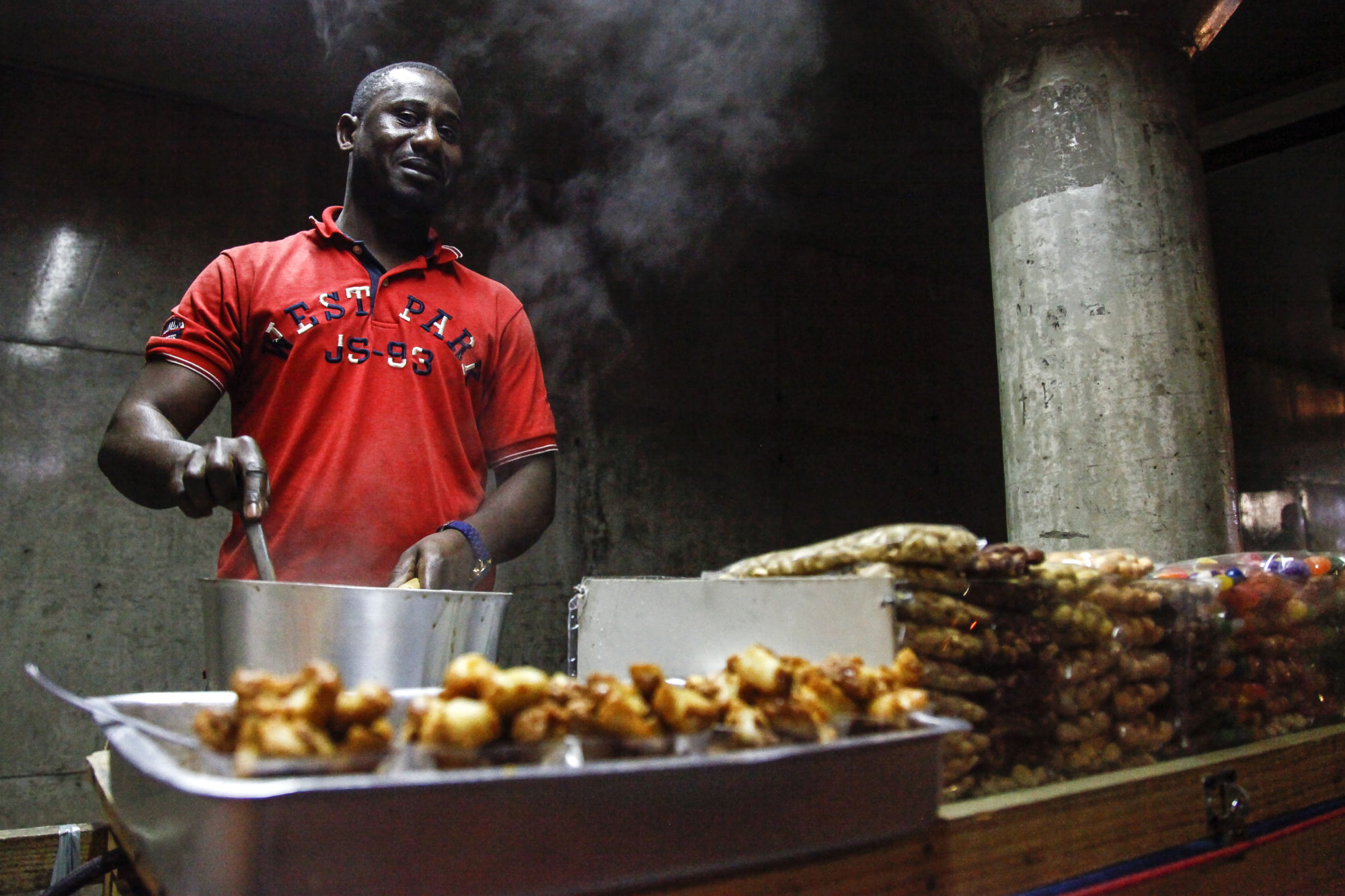

Clement, a Guinean refugee, walks outside the Scalabrinian Mission Shelter in Sao Paulo, Brazil, on 05 July of 2017. (Photo by Marcelo Pereira)
Guaianazes street, downtown Sao Paulo
On Rua Guaianazes there is a run-down mosque on the second floor of an old and degraded building, which is frequented by many African migrants. Outside, the smell of marijuana and crack is inebriating. Crowds gather on the streets in front of the packed bars, while different people ask us if we want cheap marijuana. We enter one bar that has literally no chairs or tables: there is a poster of Cameroon’s most famous footballer Samuel Eto’o on the wall, and a big snooker table in the centre while all around customers gamble, argue and smoke. The bartender tells us it is a Nigerian bar, but that it is frequented by Africans of all nationalities. Among the offers of marijuana, crack and cocaine, laughs, music and loud chat, you can barely hear to the imam’s call. Rua Guaianazes is considered to be the heart of Cracolandia, a territory controlled by organized crime for more than a decade and now reportedly home to some African-led drug trafficking gangs.
“K.”, 39, Sierra Leone
At Caritas, a non-profit providing support to refugees and migrants, we met “K” (who asked not to reveal his full name), who had left Sierra Leone three months ago. His grandfather was a chief priest of a secret society for whom it is a tradition to initiate the oldest son of the family when the former elder dies. A Christian and a graduate in Information Technology, “K” refused to take part in the ritual and says he was then targeted. He fled to stay with family in the interior of the country, but was kidnapped and held captive in the forest. One night he managed to escape to the city and met a woman from a Christian organization which provided airplane tickets so he could leave immediately for Brazil.
Clement Kamano, 24, Guinea-Conakry
Kamano was studying Social Sciences at Université Général Lansana Conté when he took part in the protests of September 28th, 2009, which ended up in a massacre with more than 150 people killed. Afterwards, he was repeatedly harassed because of his involvement in social movements. Fearing he might be killed, his father bought him a ticket to Brazil. Now he is a political refugee, who is almost fluent in Portuguese, and who enjoys talking about the sociologist-philosophers Emile Durkheim and Max Weber, even Leibniz and Nietzsche. He is currently applying to join a federal university in Sao Paulo.
Scalabrinian Mission, Canindé neighbourhood
The Scalabrinian Mission in the neighborhood of Canindé provides philanthropic aid to migrants. Soror Eva Souza, the director, says they have helped people from Africa (Angola, Congo, Guinea, Togo, Nigeria, South Africa, Mali, British Guyana, Somalia, Mauritania, Sierra Leone, Cameroon and Uganda), North Africa and the Middle East (Syria, Tunisia, Morocco, Egypt), Asia (Cambodia, South Korea, the Philippines, Bangladesh), Europe (The Netherlands, Russia, France) and Latin America and the Caribbean (Colombia, Venezuela, Bolivia, Haiti, Cuba). The Mission provides housing, food, clothing, medication and facilities for migrants. They only receive a small amount of financial support from local government, but work to help migrants find a job so they can live independently. Souza says many of those who arrive at the house are ill: some are seriously injured, others sick from the journey or the conditions they were living in before arriving in Sao Paulo. Since 2015, she says she has seen human trafficking and slavery victims, drug mules, political refugees, and people who have lost their families en route. When we visit 40-year-old Mohamed Ali, from Morocco, was trying to find a job with the support of the Mission.

Senegalese restaurant Lalingé became a meeting point for refugees in Sao Paulo, Brazil, on 04 July of 2017. (Photo by Marcelo Pereira)
“H”, 42, Angola
“H” is an Angolan woman now living in a house rented from the Baptist church. The area outside the house is a “boca de fumo” – an open drug dealing spot managed by armed guards. “H’s” house is annexed to the church building itself, and is very rustic and simple. She arrived a year ago with two of her children, and also pregnant. She says that after the family of the Angolan president took over the market of smuggled goods in her country, her small import business started to crumble. Her husband and two more daughters are still there. She is currently unemployed, but happy that her young son is studying, although often he comes home complaining about racism at school. “H” does not want him to play with the neighbourhood children, she is afraid he will be drawn to narco-trafficking if he gets in with the wrong crowd. In the long run, she wants to go back to Angola, but only under “a different political situation.”
Lalingé restaurant, Sao Paulo
Arami, the owner of the bustling restaurant Lalingé – which means “The Princess” in her language – has been in Brazil for seven years. She opened the restaurant a year ago so that the African community in the Centro neighbourhood has a place to gather and eat food from their continent. It’s the kind of place people arrive at any time of the night or day, order their food and chat.


